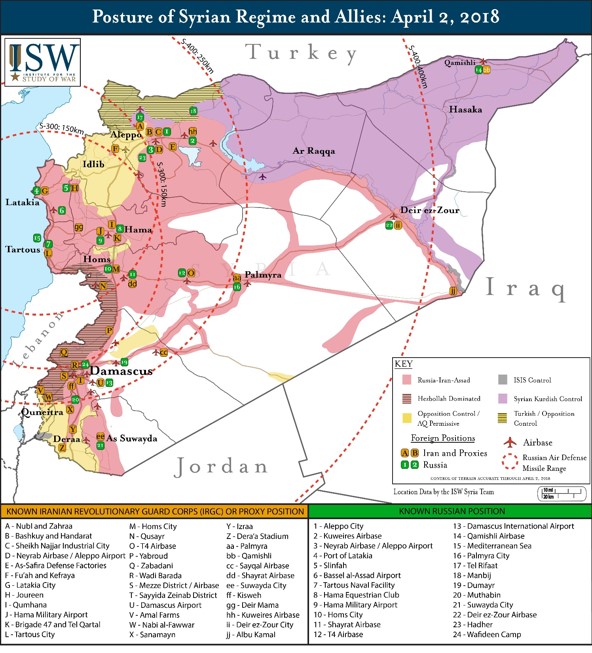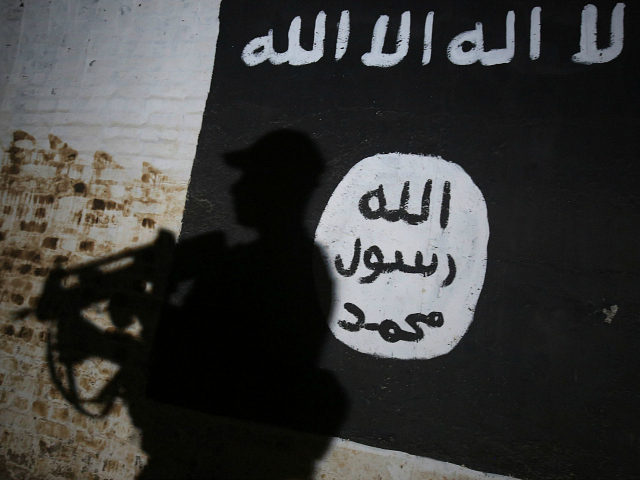The Islamic State (ISIS/ISIL) has suffered devastating losses in Iraq and Syria under U.S. President Donald Trump that have decimated the group’s territorial caliphate, ultimately squeezing the jihadists into ever-shrinking pockets of land in Syria.
U.S. Maj. Adrian Rankine-Galloway, Pentagon spokesman, told Breitbart News that ISIS has been reduced to a “small” presence in Syria, noting:
The United States and our partners remain committed to eliminating the small ISIS presence in Syria that our forces have not already eradicated.
We look forward to working with our partner forces in Syria to achieve the lasting defeat of the criminal terrorist organization ISIS, and to ensure they cannot return.
ISIS must not have a place from which to plan and coordinate attacks against the region and against the nations of the Coalition. Much work remains. The fighting will be difficult, but we and our partners will prevail.
A map of control of terrain in Syria, recently published by the Institute for the Study of War (ISW), shows that ISIS only holds two very small pockets of land bordering Iraq and Jordan.

Despite the group’s “considerable losses,” U.S. Central Command (CENTCOM) — charged with American military operations in the Middle East — repeatedly warns that the remnants of ISIS still pose a threat.
In April, when Trump insisted he wanted to “get out of” Syria, he asserted that he would first ensure ISIS is defeated.
“As the President has said, we will ensure that that ISIS cannot return and that populations liberated from ISIS are not exploited by the [dictator Bashar al] Assad regime or its Iranian supporters,” Maj. Rankine-Galloway told Breitbart News, suggesting that American troops are still fighting ISIS in Syria.
In Iraq, however, the U.S. military demobilized the command charged with overseeing American ground forces at the beginning of this month, a move that signaled the end of major combat operations against ISIS.
Baghdad officially declared victory over ISIS in December 2017, marking the end of the jihadists’ self-declared territorial caliphate.
The U.S. has indicated it intends to maintain a residual troop footprint in the country to prevent a resurgence of the jihadists.
U.S. forces have “almost completed” the task of defeating ISIS, the president indicated in April.
Late last month, CENTCOM acknowledged, “the Coalition and our partners have liberated more than 90% of the area formerly controlled by [ISIS], and have liberated 7.7 million Iraqis, and Syrians once held under brutal [ISIS] rule.”
The U.S.-led coalition and local forces regained a significant portion of the territory once held by ISIS after the Trump administration came to power.
President Trump authorized American troops to enhance their footprint significantly and increase the number of munitions dropped on jihadists in Iraq and Syria. Trump’s approach marked a substantial difference from that of former President Barack Obama, who opted for a “light footprint” strategy with minimal American troops.
In August 2017, only six months into the Trump’s tenure, Obama holdover Brett McGurk, the U.S. president’s special envoy to the anti-ISIS coalition, acknowledged that the terrorist group’s losses had “dramatically accelerated” under the current administration.
McGurk attributed the increase in ISIS losses to “key changes” under Trump, including a “campaign of annihilation” that has primarily concentrated on surrounding cities held by the jihadist group before launching full offensives, to ensure terrorists “cannot escape.”
Trump’s delegation of decision-making authority to the armed forces has allowed much greater U.S. military responsiveness to unforeseen circumstances, pointed out the envoy.
ISIS’s two major strongholds in Iraq and Syria — with capitals in Mosul and Raqqa, respectively — fell to the U.S.-led coalition and local forces under President Trump’s watch.
“Despite considerable losses, ISIS retains capabilities to plan and coordinate attacks against the region and Coalition homelands,” CENTCOM reported on May 1.
A recent sting by Iraqi and American intelligence officers led to the capture of five ISIS commanders, including a top aide to the group’s chief Abu Bakr al-Baghdadi.
Iraqi officials described the operation as a “major victory” with one saying, “the noose is tightening around him,” referring to the ISIS leader Baghdadi.
U.S. Col. Ryan Dillon, a spokesman for the American-led coalition, confirmed the raid, calling it a “significant blow” to the group.
President Trump also lauded the capture of the commanders, alluding to them as “five most wanted leaders of ISIS.”
Five Most Wanted leaders of ISIS just captured!
— Donald J. Trump (@realDonaldTrump) May 10, 2018
Some experts have accused the Trump administration of declaring victory against ISIS too early.
“The Trump administration has prematurely declared victory against the Islamic State,” Bill Roggio, an expert at the Foundation for Defense of Democracies (FDD) and editor of the Long War Journal, told Breitbart News. “It still controls territory in Syria and is battling [dictator Bashar al] Assad’s forces.”
“The Islamic State remains a local and global threat and is still trying to promote and execute attacks in the West,” he added.
U.S. intelligence officials warned in the most recent Worldwide Threat Assessment issued in February,” Over the next year, we expect that ISIS is likely to focus on regrouping in Iraq and Syria.”

COMMENTS
Please let us know if you're having issues with commenting.